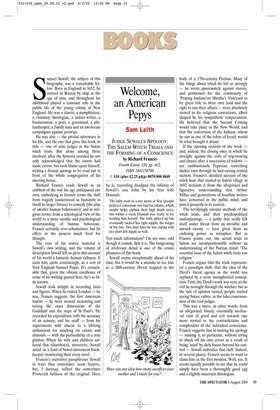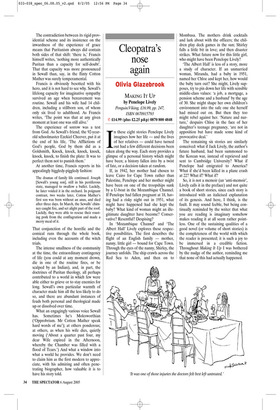Welcome, an American Pepys
Sam Leith
JUDGE SEWALL’S APOLOGY: THE SALEM WITCH TRIALS AND THE FORMING OF A CONSCIENCE by Richard Francis Fourth Estate, £20, pp. 412, ISBN 1841156760 ✆ £18 (plus £2.25 p&p) 0870 800 4848 Samuel Sewall, the subject of this biography, was a remarkable fellow. Born in England in 1652, he arrived in Boston by ship at the age of nine, and throughout his adulthood played a constant role in the public life of the young colony of New England. He was a diarist, a pamphleteer, a visionary theologian, a nature-writer, a businessman, a poet, a gourmand, a philanthropist, a family man and an inveterate campaigner against periwigs.
He was also — the pivotal adventure in his life, and the one that gives this book its title — one of nine judges at the Salem witch trials. But alone among those involved, after the hysteria receded he not only acknowledged that the courts had made errors, but took blame upon himself, writing a formal apology to be read out in front of the whole congregation of his meeting house.
Richard Francis reads Sewall as an emblem of the way his age anticipated our own, embodying in literary terms the shift from tragedy (understood as humanity in thrall to larger forces) to comedy (the play of smaller human behaviours); and in religious terms, from a teleological view of the world to a more secular and psychological understanding of human behaviour. Francis certainly over-schematises; but he offers in the process much food for thought.
The core of his source material is Sewall’s own writing, and the volume of description Sewall left us gives this account of his world a fantastic human richness. It casts him, quite convincingly, as a sort of New England Samuel Pepys. It’s remarkable that, given the vibrant excellence of some of his writing quoted here, he’s so little known.
Sewall took delight in recording facts and figures. When he visited London — he was, Francis suggests, the first American tourist — he went around measuring and noting the exact dimensions of the Guildhall and the steps of St Paul’s. He recorded his expenditure with the accuracy of an actuary, and his scoff — from his experiments with cheese to a lifelong enthusiasm for snacking on raisins and almonds — with the particularity of a true glutton. When his wife and children suffered flux (diarrhoea), moreover, Sewall acted ‘as a kind of bowel-movement bookkeeper, monitoring their every stool’.
Francis’s narrative paraphrases Sewall in ways that sometimes seem bizarre, but, I daresay, reflect the sometimes Pooterish fullness of the original. Here he is, recording deadpan the infancy of Sewall’s son John by his first wife Hannah:
The baby went to a wet nurse at first (people believed colostrum was bad for infants, which maybe helps explain their high death rate), but within a week Hannah was ready to try feeding him herself. The baby played up but eventually sucked her right nipple, the longer of the two. Two days later he was coping with her short left nipple as well.
Too much information? I’m not sure, odd though it sounds, that it is. The burgeoning of irrelevant detail is one of the comic pleasures of this book.
Sewall seems exceptionally ahead of his time, but it would be a mistake to see him as a 20th-century liberal trapped in the body of a 17th-century Puritan. Many of the things about which he felt so strongly — he wrote passionately against slavery, and petitioned for the community of ‘Praying Indians’on Martha’s Vineyard to be given title to their own land and the right to run their affairs — were absolutely rooted in his religious convictions, albeit shaped by his sympathetic temperament. He believed that the Second Coming would take place in the New World, and that the conversion of the Indians, whom he saw as one of the tribes of Israel, would be what brought it about.
If the opening sections of the book and, indeed, the closing ones in which he inveighs against the evils of wig-wearing and chases after a succession of widows are rumbustiously Pepysian, something darker runs through its hair-raising central section. Francis’s detailed account of the witch hunt that started in Salem village in 1692 reclaims it from the allegorical and figurative understanding that Arthur Miller and generations of headline writers have cemented in the public mind, and puts it properly in its context.
The terrifyingly circular methods of the witch trials, and their psychopolitical underpinnings — a polity that really felt itself under threat from an invisible and inward enemy — have given them an enduring power as metaphor. But as Francis points out, the actual trials in Salem are incomprehensible without an understanding of the Puritan mind: ‘The essential issue of the Salem witch trials was religion.’ Francis argues that the trials represented a paradigm shift: that the idea of the Devil’s literal agency in the world was replaced by a more metaphorical conception. First, the Devil’s work was seen as the evil he wrought through the witches; but as the tide of opinion turned, people started seeing Satan, rather, in the false consciousness of the trial judges.
This was a move, in other words, from an allegorical, binary, essentially mediaeval view of good and evil towards one more rooted in the contradictions and complexities of the individual conscience. Francis suggests that in making his apology — making it, in particular, without trying to shuck off his own errors as a result of being ‘used’ by dark forces beyond his control — Sewall embodies that shift. Indeed, in several places, Francis seems to want to claim him as the first modern. Well, yes. It seems equally possible to me that he could simply have been a thoroughly good egg and a slightly uncertain theologian. The contradiction between its rigid providential scheme and its insistence on the inwardness of the experience of grace means that Puritanism always did contain both sides of that shift: ‘there is,’ Francis himself writes, ‘nothing more authentically Puritan than a capacity for self-doubt’. That that capacity was more pronounced in Sewall than, say, in the flinty Cotton Mather was surely temperamental.
Francis is obviously besotted with his hero, and it is not hard to see why. Sewall’s lifelong capacity for imaginative sympathy survived an age when bereavement was routine. Sewall and his wife had 14 children, including a stillborn son, of whom only six lived to adulthood. As Francis writes, ‘The point was that at any given moment at least one was still alive.’ The experience of sorrow was a test from God. As Sewall’s friend, the 92-yearold schoolmaster Ezekiel Cheever, put it at the end of his life, ‘The Afflictions of God’s people, God by them did as a Goldsmith, Knock, knock, knock, knock, knock, knock, to finish the plate: It was to perfect them not to punish them.’ At another time, Francis reports in his appealingly higgledy-piggledy fashion:
The dramas of family life continued. Joseph [Sewall’s young son], still in his pestiferous state, managed to swallow a bullet. Luckily, he later voided it in the orchard. In poignant contrast, two weeks later, Cotton Mather’s first son was born without an anus, and died after three days. In March, the Sewalls’ chimney caught fire, and set alight part of the roof. Luckily, they were able to rescue their roasting pork from the conflagration and made a merry meal of it.
That conjunction of the horrific and the comical runs through the whole book, including even the accounts of the witch trials.
The intense smallness of the community at the time, the extraordinary contingency of life (you could at any moment drown, die in one of the routine fires, or be scalped by an Indian), and, in part, the doctrines of Puritan theology, all perhaps contributed to a world in which few were able either to grieve or to stay enemies for long. Sewall’s own particular warmth of character made him all the less likely to do so, and there are abundant instances of feuds both personal and theological made up or dissolved over time.
What an engagingly various voice Sewall has. Sometimes he’s Molesworthian (‘Opprobrium. Mr Cotton Mather speak hard words of me’); at others ponderous; at others, as when his wife dies, quietly moving (‘About a quarter past four, my dear Wife expired in the Afternoon, whereby the Chamber was filled with a flood of Tears.’) And what a window into what a world he provides. We don’t need to claim him as the first modern to appreciate, with his admiring and often penetrating biographer, how valuable it is to have his story told.












































 Previous page
Previous page